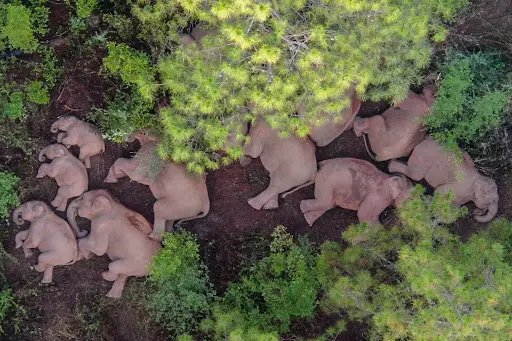You know you love a good night’s sleep, right? Well, imagine this – giant elephants snoozing away in the African savanna under a blanket of stars. These magnificent creatures have some truly astounding sleep habits that will blow your mind! Did you know that elephants only sleep 3 to 4 hours a night? Or that baby elephants need way more shut-eye than their enormous elders? Join us on a journey into the fascinating sleep behaviors of elephants in the wild. You’ll be wide awake uncovering secrets about how and when these gentle giants slumber. Plus, learn fun facts about elephant dreams and how they cleverly avoid predators while sawing logs out in the open. Grab your jammies and get ready to explore the incredible slumber party that happens nightly on the savanna. This sleepover is one you won’t want to miss!
Elephant Sleep Patterns Are Unique Among Mammals
Elephants are truly astounding creatures when it comes to sleep. Unlike most mammals that sleep lying down, elephants can actually sleep standing up! They are able to lock their legs in place so they remain upright while dozing. How cool is that? This allows them to get some shuteye without worrying about predators sneaking up on them.
Flexible Sleepers
Elephants are also incredibly flexible in their sleep patterns. In the wild, they only sleep for about 2 to 5 hours at a time, spread out over the night. They tend to sleep more at night when it’s dark out but will nap during the day too when they get the chance. Some elephants have even been observed sleeping for only 30 minutes at a time! This sporadic sleep pattern likely developed as an adaptation to their environment in order to avoid predators and allow them to be on alert even while resting.
Social Sleepers
Elephants are very social animals, so it’s no surprise they like to sleep together in close-knit family groups. Female elephants, called cows, sleep with their young calves cuddled up by their side. The calves will continue to sleep with their mothers for up to 5 years until they are old enough to sleep with other calves. Male elephants, called bulls, also form long-term social bonds and will sleep near each other at night, though not quite as closely as the females and their calves.
The sleeping habits of elephants prove they continue to amaze us with their intelligence, adaptability, and close social bonds. Sweet dreams, gentle giants!
How Much Do Elephants Sleep in the Wild?
Elephants Are Champion Sleepers!
Elephants in the wild love to sleep – did you know these giant creatures sleep for a whopping 3 to 7 hours every day? That’s almost half their day snoozing the hours away! Elephants are known as champion sleepers in the animal kingdom. They sleep the most of any mammal.
Daytime Dozers and Nighttime Nomads
Elephants are unusual in that they only sleep for short periods during both the day and night. They tend to sleep in spurts of just 2 to 3 hours at a time, both while resting in shade during the hottest parts of the day and at night when their herd settles down. Elephants are nomadic, walking up to 50 miles per day, so they sleep whenever they can!
Sleeping on Their Feet – Almost!
The most fascinating part is that elephants can sleep both lying down and standing up! They often sleep lying on their sides, but they can remain standing while sleeping without toppling over. Their huge body size and column-like legs lock into place, allowing them to sleep upright. Elephants only lie down to sleep for 3 to 4 hours per day – the rest of their snooze time is standing up while dozing.
Social Sleepers and Guard Duty
Elephants are very social and sleep in close-knit family groups. The herd provides protection, with several elephants staying awake to keep guard while others sleep. Elephant calves will sleep next to their mothers for several years until they are old enough to stand with the rest of the herd. The social nature and daily activities of elephant herds in the wild is truly fascinating. Their unique sleep habits and tight family bonds are inspiring!
The Stages of Elephant Sleep
Deep Sleep
Elephants get the most deep sleep of any stage, about 4 hours per night! During deep sleep, elephants lie down and become almost motionless. Their breathing slows down, heart rate decreases, and brain waves slow down. This stage is essential for elephants to feel well-rested and recharged the next day. Deep sleep is when an elephant’s body repairs muscles, stimulates growth, and boosts their immune system.
REM Sleep
Elephants experience REM sleep for about 2 hours each night, usually in the last third of their sleeping time. During REM sleep, elephants’ brains become very active, but their muscles remain still. This is the stage where elephants likely dream! Their eyes move rapidly from side to side behind their eyelids, and their brain waves increase to levels seen when elephants are awake. REM sleep plays an important role in memory consolidation and learning in elephants.
Light Sleep
For the remaining few hours of sleep, elephants experience light sleep. Their brain waves slow down, but their muscles can still move. Elephants may toss, turn, and adjust their sleeping position during this stage. Their eyes also slowly move during light sleep. Although not as restorative as deep sleep, light sleep does provide some rest for elephants.
Overall, elephants demonstrate a fascinating array of sleep stages not unlike our own. Their complex sleep patterns show how intelligent and emotionally sophisticated these majestic animals truly are. By understanding elephant sleep, we gain a deeper understanding and appreciation for these remarkable creatures.

Why Elephants Need So Little Sleep
Elephants are amazing in so many ways, not least of which is their sleep habits. These enormous animals only sleep 3 to 4 hours a night but seem as energetic as ever during the day. How do they do it? Their secret is all in how they sleep.
When elephants do sleep, they make the most of it. Elephants can reach REM sleep, the deepest stage of sleep where dreaming occurs, in just a few minutes. For humans, it takes 90 minutes. Elephants also spend a whopping 80% of their sleep time in REM sleep. This means they can pack all the restorative benefits of sleep into a few short hours.
Another reason elephants need little sleep is their diet. Elephants consume massive amounts of plants, up to 300 pounds per day for some individuals. All those plants are high in nutrients but low in calories. To get enough energy, elephants have evolved highly efficient digestion. Their digestive systems can break down cellulose, the main component of plant cell walls that most animals can’t digest. This efficient system provides elephants with lots of energy, even on little sleep.
An elephant’s size and build also allow it to operate on little rest. Elephants don’t sleep standing up but they do sleep lying down, and their huge frames make it easy to snooze in a standing position. Their pillar-like legs lock into place, supporting their weight without effort. Elephants only lie down to sleep for a few hours at night, then they’re back on their feet during the day with their legs doing all the work.
Elephants live exciting, complex social lives in the wild that likely also reduce their need for sleep. Elephant herds are extremely social and tight-knit. They travel together, play together, bathe together, and comfort each other when distressed. All these rich social interactions stimulate elephants physically and mentally, keeping them energized even without much sleep.
So while you and I require 7-9 hours of shut-eye per night to function, elephants have evolved some nifty adaptations that allow them to get by on catnaps. Their efficient sleep, plant-based diet, size, and active social lifestyle give elephants all the energy they need to thrive on just a few hours of rest. Aren’t elephants amazing?
Elephant Sleep FAQs: Your Top Questions Answered
How much do elephants sleep?
Elephants are champion sleepers, logging an impressive amount of shut-eye each night. Adult elephants catch a whopping 3 to 7 hours of deep sleep, and snooze for up to 14 hours a day total! Their slumbering habits change based on the season and environment. During the hot dry season, they are more active at night to avoid the heat, so they compensate by sleeping longer in the day. Talk about making us humans jealous!
Do elephants sleep standing up?
Contrary to popular belief, elephants do not sleep standing up. These gentle giants actually sleep lying down, usually on their sides. They go through a process of ‘going to ground’ where they slowly kneel and then roll onto their side. To get back up, they rock onto their knees and push themselves up with their front legs. While sleeping, they remain in light sleep and continue to flap their large ears, which helps regulate their body temperature. How adorable is that?
Where do elephants sleep?
In the wild, elephants prefer to sleep under large trees, especially baobab and acacia trees. The shade offers protection from the hot sun and the wide trunks work well for scratching those hard to reach places! They clear the area around the tree of brush and create a circular sleeping spot. Females and calves sleep together in tight-knit family groups for safety and bonding.
Did you know wild elephants are mostly nomadic, walking up to 50 miles per day? With all that activity, it’s no wonder they value their beauty rest. Understanding how these magnificent mammals sleep helps us gain more insight into their complex social structures and daily lives in the African bush. If only we could all embrace rest with the same passion as elephants! Their sleeping habits remind us of the importance of recharging and cherishing the simple moments of peace in our busy lives.
Conclusion
And there you have it – the remarkable sleep habits of our gentle giant friends, the elephants! From their cute calf naps to the older adults’ power snoozes, these patterns show us that pachyderms value their rest time just as much as we do. As you drift off tonight and dream of these magnificent mammals lumbering across the savannah, remember that they too are settling in for a long night’s slumber under the stars. Sweet dreams, friend! Let their rhythms remind you to cherish your own sleep schedule. After all, we could all use a little more time for napping, playing, and snuggling up with our herd – elephant or human.
Don’t Miss a Thing! Enhance Your Wildlife Photography with Ultra-X Night Vision Goggles.
GET NOW!






